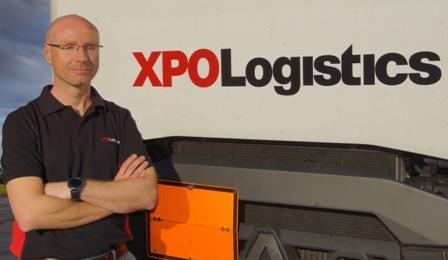
XPO Logistics’ graduate and apprenticeship programmes have their origin in Europe and in the UK. The scheme was originally introduced 25 years ago in the UK, and it boasts a famous graduate – Carol Vorderman, the maths genius who progressed from running a pea processing and packing unit in Lowestoft to TV stardom on Countdown.
CEO of XPO Logistics Europe Malcolm Wilson is a strong advocate for the programme, which is taking in almost 30% more graduates this year than in 2018 with over 42% of graduates being female.
“It's a real pleasure as a CEO of a business to talk to a new intake of graduates, as I do often,” he says. “I make a point to speak with them when they're coming into the business and at regular intervals through their training. What I see more and more are people deciding to choose a career with XPO because they see we are a dynamic business that embraces a lot of new technology.
“It's not how we imagine a logistics player some years ago. Today, it's a very attractive proposition for somebody new because they are exposed to a huge amount of modern technology, a lot of smart modern thinking in terms of management and a great culture. We work hard making it a great place to work.”
Wilson cites his UK and Ireland MD for Transport, Dan Myers, who joined what was then Christian Salvesen as a graduate trainee in 1998.

“He’s a great example of somebody coming into the business at an early age, going through all of the training, and being able to see their career progress through the business,” says Wilson. “He's grown up with the business through many different job roles with that sound basis of starting as a graduate.”
XPO’s HR director for the UK Mark Simmons takes up the story.
“The core of it is a programme that looks to develop future operational leaders for the organisation,” he says. “The aim is to identify talent who can bring in fresh approaches and new ideas. While 30% to 40% will migrate into different roles, whether that's project management, continuous improvement, HR or finance the intent is that we grow future site managers, account directors and senior Operational Leaders because that's the core of our business.”
Despite its title, not everyone on the programme has a degree, and it is open to existing staff who want to progress into management roles.
“That was a change we made about four years ago, to open it up to internal candidates,” says Simmons. “That was partly to shine a light on those who didn't go to university, and also to provide a route for our eastern European demographic who have got degrees in other countries. About 10% of the intake is internal and 90% external.”
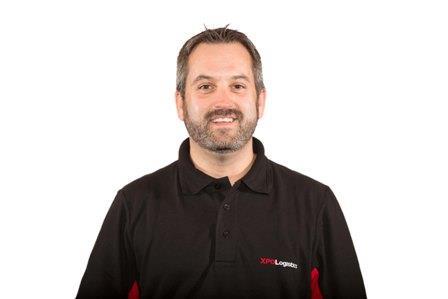
In the UK, XPO typically takes 25 to 30 graduates a year but with 22,000 employees and annual growth running at 12% it recruits as many good people as it can. “Fortunately, our business will be growing, so we're not dictated on the numbers by budget,” says Simmons. “From a broader perspective, diversity is a big challenge. Our graduate population across the last three years was 44% female. That’s increased about 15% to 20% in the last five years.”
XPO isn’t just recruiting graduates with logistics degrees.
“We do target specific universities that are renowned for logistics graduates,” says Simmons. “However, we take graduates from all different disciplines. We're recruiting intellect, great EQ, talent and a good cultural fit. A future leader is about having the correct fit, style, and approach.”
Recent graduate recruit Jessica Firth (see below) for example has a degree in Spanish and politics, while Myers was a chemistry graduate.
XPO makes extensive use of the internet to reach graduates. “We're very active on LinkedIn and the recognition from people like Glassdoor and Forbes that we've had in the last two or three years plays a part,” says Simmons. “For the last intake, we had 700 applications and that's the highest for five years. I guess the XPO brand plays a big part in that.”
Part of the appeal of the XPO brand is the variety in terms of job role and geographical location it can offer.
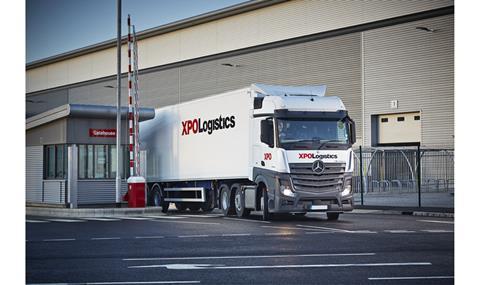
“In the UK alone, we have more than 280 sites,” says Simmons. “You can go from a customer head office in central London to a cold store in Aberdeen to a Digital Warehouse of the Future. There's so much variety in terms of the environments, the roles and the activity. That definitely helps our retention rates as well.”
Myers agrees, and having spent some time at the Aberdeen fish store himself knows it is all part of the XPO career ladder.
“The reality is the industry is a lot more diverse than people imagine,” he says. “We've got project management, finance, solutions engineers, IT… there's a whole gambit. As a company we handle the supply chain from pre-manufacturing all the way through to waste and returns.
“I've been fortunate in that I've worked in a lot of different verticals with lots of different customers.”
Once on the programme, each graduate has four job placements within XPO. Year one would include both the transport and warehousing operations while in year two the placements are more tailored to the specific role the trainee is leaning towards. While the HR teams does its best to help steer trainees down their preferred path, there has to be a balance between fulfilling their career goals and meeting the needs of the business for good managers in what might be perceived as less glamorous roles.
Firth says: “It wasn't my expectation that I would be able to guide my journey to such a degree, so that was a bonus. It’s made very clear from the beginning that flexibility is expected so I came in with my eyes wide open, knowing that I could end up in Scotland on a night shift.”
While it is hard to measure the success of the trainee programme in financial terms, XPO does have two impressive metrics. The average length of retention of graduate recruits in the UK is around two and a half years – at XPO it is more than double that at five and a half years. In addition, nearly 60% of the business’s 4,500 key management roles are filled with individuals who have been recruited and developed internally.
Around a tenth of people on the trainee scheme have come from other roles in XPO and Myers insists every one of the firm’s 22,000 employees are eligible.
“We wouldn't put any barriers in anybody's way,” he says. “I'd say it's a truly open programme. I wouldn't definitely say ‘no’ to anybody regardless of their job. They go through exactly the same assessment process and if they've got the right attitude, right approach and the right talent, then why not?”
A tale of two graduates, 20 years apart
Business analyst Jessica Firth joined XPO in January 2017
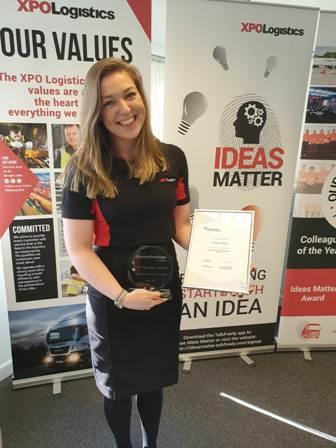
MT: What attracted you to the logistics industry and the XPO graduate programme?
Firth: “One of the most exciting things is the new tech that's coming through; I think that will be such a key way of getting new people through the door. The growing importance of big data and robotics means we're going to need so many different academic backgrounds within the industry. I was able to work on one of the bigger automation projects, and it's such an exciting opportunity that will draw a lot of people in.
“I didn't have a clue about logistics when I left university. I worked for my family business, which is a school uniform retailer, for three years. I did everything from buying and acquiring new business, through to driving around in the van delivering it all. It was only later, on reflection, that I realised how well that set me up for a career in logistics.
“People might not necessarily know about logistics if they haven't done it as their degree, but everything that you do in life is part of ‘it’; when you buy something from a shop or buy online, you are part of the global supply chain.”
MT: How did you come to apply for the XPO programme and how has it been so far?
JF: “I just did a general online search. I was looking for different opportunities that were available. Ultimately it was definitely the people that attracted me to XPO; it was a very friendly application process. You're making friends and networking within that intake group from the very beginning.
“You've got a nice mix of people, with some straight out of university but then you've also got people like myself who have had practical work experience.”
“The people assessing you are very senior members of the business. That gives you the impression that you are being invested in from very beginning, even though you're not through the door yet. These people are willing to spend time in that room with you, to see if you are the right fit for the business.”
“When you first join, you are assigned a mentor who is usually a senior person within the business. They can think about not just the next step but about the next five steps and where you're going to be in the future.”
“I'm now a business analyst within the temperature-controlled business unit.”
“It was really the people that pulled me through the door. For me it was about getting experience in a broad range of areas within the business. I know the kind of person I am and I thought I was interested in project management, even though I didn't really know what project management meant; this programme gave me the opportunity to find out.
“I'd had a little bit of management experience, but on a very small scale, whereas at XPO I had a team of about 60 on my third placement.
“I was very nervous about my operational placement. I didn't know what to expect and it was a big step. I'm glad I had that opportunity to run a team. That's what I was definitely expecting to get that out of it because they made very clear from the beginning that there will be an operational placement.
“For me, it's about more than just salary. It is the people that you work with and the business’ continuing investment in you as an individual. I would say my program has stood up against anything that my peers have done in their graduate programs, if not above.
MT: Have you found logistics sexist?
JF: “We were quite small intake of five or six people and three were women. There are definitely more men in the industry, however, I've never felt that's an issue. It could be me as a person but I've never felt discriminated against because of my gender. I think in every room that I've been in, if you have something to say, and if it's sensible, then you can feel free to say it and nobody is going to not listen to you or your ideas."
Now UK and Ireland MD of Transport, Dan Myers joined Swift, then part of Christian Salvesen, as a graduate trainee in July 1998
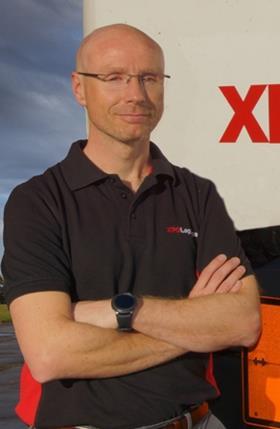
MT: How has the programme changed since you experienced it?
DM: “I don't get the impression that it's ever really changed over that time. It's definitely got more structured, and it's improved in terms of helping people understand the potential career opportunities in the organisation. The business has always placed a lot of importance on the quality of its people. At the end of the day, we are a service industry, so the quality of the people dictates the quality of our service, and we recognise that we're not just competing with our direct competitors but we're competing with the other big blue-chip names to get the very best people because they will deliver the very best results.
“We have been very successful in that. That importance placed on the quality of people has always been a priority. It's very much about an individual's capability. If you've got the capability, the opportunities are there for sure."
MT: What attracted you to logistics and how has the job changed since you joined?
DM: “What attracted me to this industry was the ability to work as part of a team, work very closely with people and overcome obstacles and challenges. Just as I was debating in my mind what I wanted to do for a living I saw the advert in the student newspaper for the grad programme.
“It explained that you wouldn't spend all your time sat behind your desk. You'd be out there working with customers, working with employees, working with other managers and stakeholders in the group, and that's what really appealed.
“One of the things that makes it interesting to work in the industry is the diversity of people. We've got some huge customers, real blue-chip names, but within an hour you can be in another meeting with a guy whose business it is. He's the entrepreneur who's built it, and it’s really interesting to work with so many different cultures.
“Then the next minute, you could be chatting to a driver or a warehouse colleague on the shop floor. So, you've got to be really adaptable and work with a wide range of people.
“When it came to the induction process, although it was probably a little less structured than it is now, even back then there was a huge amount of senior support. You met the MD, the operations director, the finance director. So already you were being introduced to people at a senior level, and it was always very informal and they were open with their own experience.
“Much more now, we're a technology-driven industry and we spend a huge amount on technology. We recognise that we're out there fighting for the talent and we've got to be seen as a quality top-tier employer. That's why we are doing a huge amount of outreach in local communities, where we're raising thousands every week for charities.
“It's a great company and a great industry. If you're prepared to work hard, apply yourself and use your common sense, you can have a fantastic career.”













